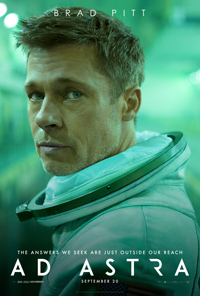All Alone in the World: Gray Elegantly Propels Trademark Themes & Style into Outer Space
 The curiosity of witnessing James Gray try his hand at the sci-fi epic was always going to be damped by the ultimate realization that Ad Astra turns out to be predictable in the best sense of the word; the space-travel framework merely the latest in a series of migrations, journeys and displacements in the director’s filmography, and a direct replication in space of The Lost City of Z (review). The grandiose simplicity of his style now graces a title that is as grounded and as linear as anything in the genre, and still feels like the epitome of sophistication. Brad Pitt’s prodigious son looks for a lost father across the stars, in one of the actor’s best and most soulful performances, following a basic Heart-of-Darkness blueprint of absorbing intensity.
The curiosity of witnessing James Gray try his hand at the sci-fi epic was always going to be damped by the ultimate realization that Ad Astra turns out to be predictable in the best sense of the word; the space-travel framework merely the latest in a series of migrations, journeys and displacements in the director’s filmography, and a direct replication in space of The Lost City of Z (review). The grandiose simplicity of his style now graces a title that is as grounded and as linear as anything in the genre, and still feels like the epitome of sophistication. Brad Pitt’s prodigious son looks for a lost father across the stars, in one of the actor’s best and most soulful performances, following a basic Heart-of-Darkness blueprint of absorbing intensity.
“He promised me one day I could join him in his pursuit” wistfully laments quintessential James Gray character Roy McBride, an almost supernaturally gifted astronaut whose heartbeat never rises above 80. He’s perhaps the best of us, and surely the best in the near-future NASA program he works in, except for his father Clifford, so legendary that “he was the program.” Disappeared and presumed dead, Clifford (quintessential stern father figure Tommy Lee Jones) left Roy to grow up on Earth with the ambition to measure up to him – and now the son is sent to Neptune to investigate whether the father is the cause of an anti-matter experiment that is causing deadly power surges on our planet.
To a distracted eye, the looks of Ad Astra may seem just a cookie-cutter reprisal of a certain cinematic space aesthetic that has dominated the decade. Hoyte van Hoytema’s cinematography doesn’t help matters due to his Interstellar association, and yet this is James Gray through and through, favoring contemplation over complication, and infusing each sequence with a strong tactile, anachronistic feeling that always leads the soul back to Earth. Gray makes the concept explicit in the first sequence, in which Pitt walks through a tunnel in full space gear, only to get out of a hatch and reveal himself as tethered to Earth through a giant antenna. The vertigo is stronger than if the structure wasn’t there. The space is vast because it’s a terrestrial one – an invisible force which never vanishes, even when stretched through a clever story structure based around a series of stops McBride has to make on his journey.
The almost mundane sense of progression from Earth to Moon to Mars to Neptune – complete with the effortless world-building and the extraneous but enjoyable commentary on the commodification of moon traveling – sells the weight of the commute and the dread of the destination in a way that is incredibly relatable for something that features a high-speed pirate chase on the lunar surface.
One of several such set-pieces, ostensibly tacked onto a naturally quieter, more spiritual quest, that sequence approaches the levels of what Gray did in We Own The Night (2007), which remains one of the great car chases of contemporary cinema. Pathos and technical brilliance cannot be unnecessary when they are this good, plus they offer Gray the chance to re-affirm his profoundly humanistic poetic of dignified conflict, in which the cost of human life is always felt to the bone.
All this amber-lined greyness, and claustrophobic slivers of red (for the moody, onirical Mars section) are in service of yet another parable of sons wanting to be heroes along their fathers, and fathers needing to leave their sons in order to be heroes: incompatible pairings still finding the brief moments of ecstatic communion that Gray can navigate with astonishing emotional clarity. Ad Astra mixes the extreme focus on two individuals with a broader interest for the presence of life in the universe, and finds poignant, radical ways to boil them both down to their essence.
★★★★/☆☆☆☆☆
Reviewed on August 29th at 2019 Venice Film Festival – Competition section. 124 min.


